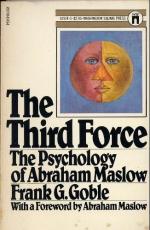|
This section contains 672 words (approx. 3 pages at 300 words per page) |

|
Germinal: Applying Maslow's Theory of Actualization
Summary: Based on Dr. Abraham Maslow's theory of self-actualization, residents of the mining community fictionalized in Emile Zola's novel Germinal could never attain success in their revolution over their bad working conditions. This is because their minimum needs, which Maslow labeled as deficient needs, were not met; thus, they were unable to achieve actualization, which would enable the mining community to develop attitudes and habits of success.
Rampant child rape, indiscreet public sex, gangs of thieving children, mobs of murderous men and women, these are the images that characterize the mining community set forth in Germinal, by Emile Zola. The graphic images presented by Zola leaves the reader wondering about a society that could allow such harsh conditions for their young. Everyone worked yet they could afford not meat but just bread from their earnings. Food was scarce and the only activity besides work was sex. The workload increased at any time and the worker was at the absolute mercy of the manager or owner of the mine where he worked. These conditions led to the revolution of the mining community. According to Dr. Abraham Maslow's theory of self-actualization, residents of the mining community, fictionalized in Germinal, could never attain success in their revolution because their minimum needs (labeled deficient needs by Maslow) were not...
|
This section contains 672 words (approx. 3 pages at 300 words per page) |

|


